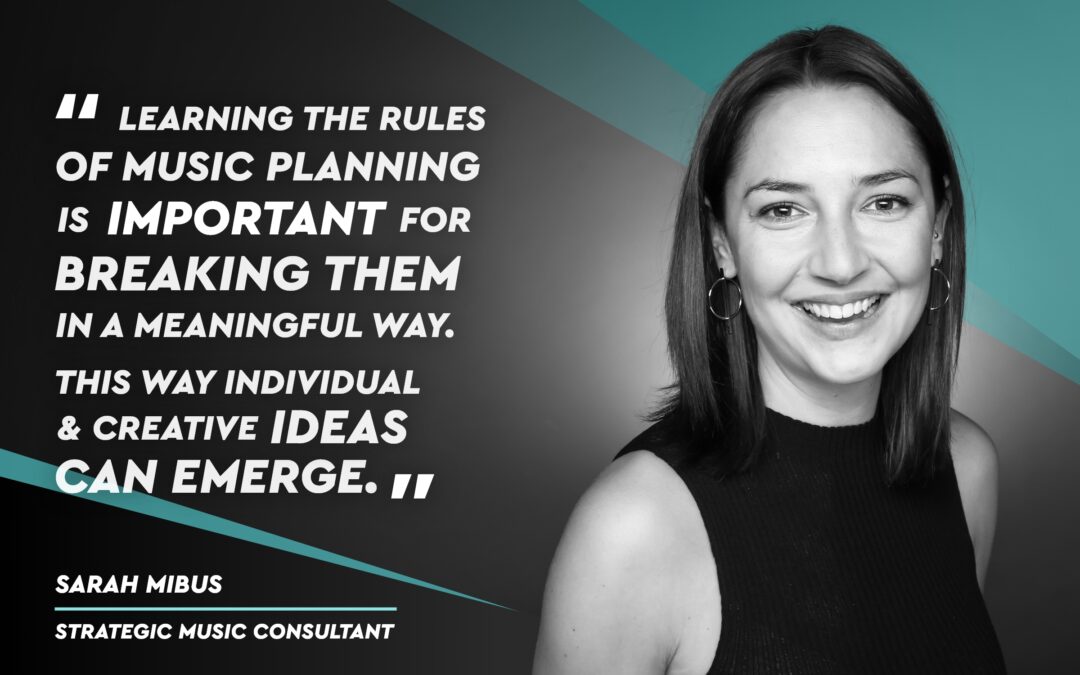Last updated on June 28th, 2023 at 02:30 pm
The guest for this #CyaniteTalks is Sarah Mibus.
Sarah is an expert in music selection and planning and she works in close contact with radio and TV broadcasting companies. She regularly holds seminars of different topics tied with the editorial world and she is a music journalism and planning lecturer at various universities.
In this interview you will get acquainted with Sarah’s profession and get her perspective on the current state of the music industry in relation to one of our hottest topics – technology.
Cyanite: Hi Sarah, you are an expert when it comes to music choice and planning. What does your job revolve around and what was your latest highlight in your professional work?
Sarah Mibus: As a freelancer I mainly support Radio and TV editors in all kinds of music queries. On one side, I always work closely around the program: I select the music and plan playlists. On the other side, I give advice to radio directors on music strategies and market orientation too. I also give seminars about these topics on a regular basis. Last year I experienced, as well as many others, a full digitalisation boost. In 2019 I still drove around for each seminar and meeting with the ICE; now everything easily goes out into the world from my top floor apartment via Zoom. I am thankful that through my job I can, in this new normality, still be in touch with many editors, radio hosts, seminar participants and students. Even though Zoom meetings cannot replace human contact – the sudden switch to digital and the realisation that it works so well has been for me the highlight of my job throughout these past few months.
Cyanite: Due to Covid-19, advertising budgets have dropped significantly and costs are being cut quickly in music. How do you deal with this?
Sarah: Among my clients there are mostly public TV and Radio editors. Budget cuts have been a recurring theme for years, everybody is encouraged to save money and funds have to be used very conscientiously. It has been like this before Covid-19. Event transmissions and presentations have not taken place since last March, for this reason a lot of money has probably been saved.
Cyanite: Imagine if you had an assistant robot, what would she/it/he do for you?
Sarah: I would urgently need someone who could tidy up my hard drive. Otherwise, I enjoy doing everything concerning my self-employment – even taxes!
“Music perceptions are so different: sad music makes some even sadder, others find comfort in it. For this reason I see a lot of potential in personalised formats in the music field “.

© Photo by Jr Korpa – Unsplash
Cyanite: Artificial Intelligence in the music field – where do you see the biggest potential for its application?
Sarah: Artificial Intelligence and algorithms are very exciting and I am curious to see where the society is going with this. Music perceptions are so different: sad music makes some even sadder, others find comfort in it. For this reason I see a lot of potential in personalised formats in the music field, we are only at the beginning. For providers such as Amazon or Spotify, each of us is a gigantic data set that we constantly feed with social media, online shopping and the daily clicks on the internet. This created a clearer consumer profile, which can be precisely served. Gadgets such as the Apple Watch give providers information even about our bodies’ biochemistry. I would not be surprised, if Spotify knew about my cycle at some point and delivered the most fitting soundtrack to my PMS mood. I find this impressive and scary at the same time. Mass programs on TV and on the radio represent the opposite. It is not about individual moods, but about creating or depicting a collective feeling, which has its own charm next to the individualised offers.
Cyanite: Creating a collective feeling sounds very exciting and also very difficult: are there any patterns or tips you’ve identified about how to work out the right music for a larger group of individuals?
Sarah: Music directors need a gut feeling for certain moods or social feelings that many people experience. For instance, this year Carnival was cancelled – a great tragedy for the inhabitants of Cologne. They now had to spend these days mostly alone at home. In such situations, it is up to the editors to ponder whether and how to depict this social feeling of sadness, nostalgia and disappointment in their programmes. This transports itself through emotive presenters and contributions that show compassion and sense of community – and of course through the right music. For example, you can deliver the carnival to the listeners’ living room or play motivating songs that give hope for a better future. One of the strengths of mass programmes is to convey the feeling of not being alone and to listen to music with others and feel like you belong with them. An important topic especially at this time!
Cyanite: What tips would you give to DIY content producers looking for music for their films or productions and that often cannot rely on a budget to consult experts?
Sarah: In my workshops I always advise the participants to listen more to their gut feeling. By this time, content creators have access to so many data to backup their decisions and to make sure to meet the taste of their audience. In this process, the personal touch and an artistic aspect often fall by the wayside. But I think it is also important to learn the rules of music planning and music use to be able to break them in a meaningful way. This way individual and creative ideas can emerge.

© Photo by Anton Maksimov Juvnsky – Unsplash
“Numbers and surveys alone are not enough to set trends […]
you need expertise, decisiveness and fun while working.“
Cyanite: If you could change one thing in the German-speaking context in the professional handling of music, what would it be?
Sarah: I would like more courage! Many music editors in this country make decisions very reluctantly or do not make them at all. At times, you blindly rely on market research results and bluntly translate the numbers into the program, without being aware of your own music strategy. This happens out of habit and / or fear. All program managers should have the goal of their daily work on hand in one sentence. I would like to see and hear that much more often! And that’s what I’m competing for! Numbers and surveys alone are not enough to set trends and create extraordinary good programs. More than ever now you need expertise, decisiveness and fun while working.
Cyanite: Your job in 10 years?
Sarah: With the best will, I don’t know how this path will look like in 10 years. But my goals is clear: to touch viewers and listeners through music and through music choices in TV and Radio formats, and to inspire and motivate my seminar participants.
Thank you Sarah for taking the time and helping us shaping our outlook to the music industry and tech.


“I think it’s important to learn the rules of music planning and music use in order to then break them in a meaningful way. In this way, individual and creative ideas can emerge.”